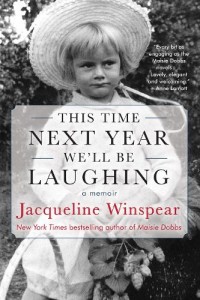
I thoroughly enjoyed this engaging memoir from the author of the Maisie Dobbs mystery series. Some of the themes and settings will be familiar to readers of those novels. Here, Winspear deftly adds family stories to her own memories of growing up in a working-class family in post-war England.
It is the war, both wars, that color their lives. Her grandfather’s shellshock from the Great War makes him hard to live with, panicking at the sound of a dropped pan. Her father, who could never bear loud noises, was assigned to an explosives team during WWII, while her mother as a child was evacuated during the Blitz. Jacqueline grew up listening to her mother’s stories “of war, of abuse at the hands of the people to whom she and her sisters had been billeted when evacuated from London, of seeing the dead following a bombing.”
Most fascinating for me are Jacqueline’s parents, colorful characters whose zest for life keeps them moving around, cash-poor but rich in love for family and the English countryside. Their mutual yearning for adventure prompts them to live with Romany travelers in between years-long forays out of London for life in rural Kent. The title comes from one of her endlessly optimistic father’s sayings.
As farmworkers, they are lucky to be given shacks to live in, which they make furniture for and fix up as best they can. Young Jacqueline joins them in picking hops and fruit when she is not exploring the fields and copses, often with her younger brother. The lessons of loving that she learns as a child from her hard-working parents—their patience with the shellshocked grandfather, their forgiveness of each other after the rare rows, their careful tending of the land—bear fruit in her own affectionate portrayal of them and their world in this book.
We learn about what inspired her to become a writer, a scene I recognised as similar to my own. And we learn a lot about her writing process as we perceive how she has made use of scenes from her life in her novels. She also shares the process of sorting through her memories, confirming some with research and finding others to be inaccurate.
This memoir doesn’t romanticise the sometimes harsh conditions and doesn’t shy away from the illnesses, accidents and other misfortunes that plague the family. Still, this is a charming read, even if you are not familiar with the novels. I was at times reminded of Laurie Lee’s Cider with Rosie, though that is from an earlier period, just after WWI and is more about village life than Winspear’s childhood on various farms.
I relished this vivid and evocative portrait of a writer’s life, a working-class life in a world far removed from today. I loved getting to know her parents and sharing, however briefly, in where their adventurous spirits led them.
Have you read Winspear’s Maisie Dobbs novels?